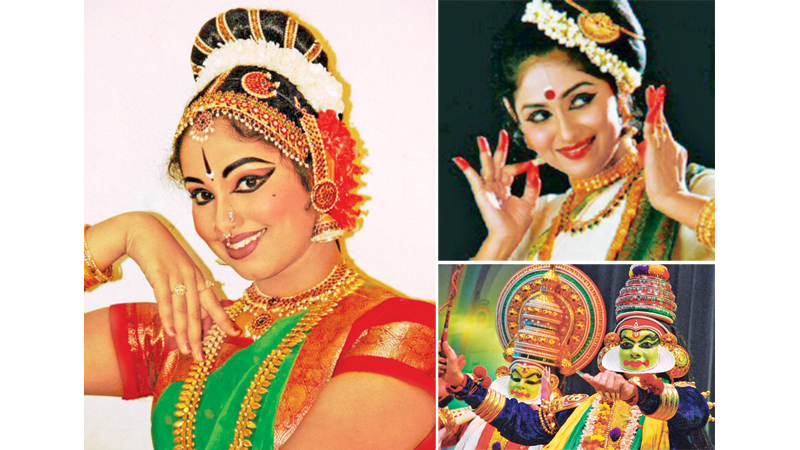Facial make-up is an important, and separate art form for any performing art. Facial make-up plays an important role in cinema, teledrama, stage drama, dance drama, and different dance fields.
For any dance form whether it is classical, folk, ritual, creative or even fusion, facial make-up is a unique art. Each classical dance form has its own selective and unique style of facial make-up. Even if it is traditional, classical, folk, ritual, creative, or fusion, without the help of the make-up artiste it is quite hard for any individual to put the facial make-up on their own.
Facial make-up for any traditional classical dance is not an easy task, as compared to other dance forms because traditional classical dance forms have their own defined, unique, and selective make-up which is adopted. For instance, most of the Indian Classical dance forms have different types of facial make-up. Bharatha Natyam, Kuchipudi, Mohini Attam, and Odissi have almost similar types of make-up. Kathakali’s facial make-up is entirely different from other Indian classical dance forms. Similarly, the North Indian Classical dance form Kathak’s facial make-up is quite different as compared to other Indian dances. Kathak dance form adopts light make-up, rather than other South Indian dance forms. Like Kathak, the East Indian dance form Manipuri dance also adopts light make-up.
Whitish complexion
The entire Indian classical dance forms belong to oriental dance forms. In the Eastern dance forms, the skin colour of the personalities also changes from one another. Some are fair; some are very fair and others are of whitish complexion. Some are of yellowish complexion, some are dark brown complexion, and some are light brown complexion. Similarly, some are very dark, and some are dark, and some are of medium complexion. Hence according to the skin colour, the basic foundation is chosen. After the basic foundation is applied; a different combination of colours is selected and mixed up together to brighten the skin colour as is necessary.
Meanwhile, the shape of the face also differs from one another, and the structure of the face also differs. Some have square shape faces, some have round shape faces, some have long faces, and some have oval-shaped faces. Even the shape of the mouth, the nose, the eyes, and the eyebrows also differ from individual to individual. Shaping the eyes, using black eyetex, and by black eyebrow pencil, are exceptional talents. Some dancers who have small eyes are a very difficult task to do eye make-up. For them, shaping the eye and making the eyes bigger is an important task for the dance. Big eyes are very much needed to express the emotional expressions in dance. In Indian classical dances, eye shadows are not used. Likewise even pasting the eyelashes, for the classical dances are not necessary or suitable. Such make-up should not be used for the classical Bharatha Natyam recitals. Eye make-up is a very important aspect of classical dance. Everybody’s eye shape differs from one another. Hence shaping the eye, according to the eye shape and face shape also differs from one another. Similarly selecting and shaping the lipstick colour is a unique and important art. Nowadays some make-up artists use lip pencils to outline the lips. Outlining the lips by the lip pencil for a classical dance recital is not much needed or desired because the pencil outline is visibly seen. Therefore it looks ugly. Always bright red colour lipstick is selected for the classical dance recitals to brighten the face.
Earlier for the Bharatha Natyam recitals, the reddish blush and pink colour rouge were applied for the cheeks. Such make-up factors are avoided now, because it makes the face look swollen, or makes the jawbones jutting out. That is why at the present the make-up artistes avoid using the rouge and the blush for Bharatha Natyam.
Blunt noses
Similarly, the nose shape also differs from one another. Some have sharp noses, others have blunt noses. Some have long noses. Whatever the nose shape happens to be, the nose ornaments, such as Pillaku, Nathu, and Nose Studs cover the nose shape. Hence the nose shape is not obviously seen, and it is covered by the Nose ornaments.
Selecting Pottu for the face depends on the shape of the individual face as well as the wish of the dancers. Some dancers like to have round shape Pottu, and others like to have long shape Pottu. Facial make-up for small children are difficult as compared to the elder ones.
Meanwhile, the eyebrow shape also differs from one another. Not only do the eyebrows differ from one another, but presently the youngsters, shape their eyebrows as they wish. Anyhow, the make-up artistes try to shape the eyebrows according to the facial features of the individual.
Hence the facial make-up for the individuals in the Classical Bharatha Natyam is a unique and excellent artistic skill. It is really regrettable that the services rendered by the make-up artistes which are very much needed for the dance field, and unfortunately their services are not much recognized or taken into account by the present society.



Add new comment